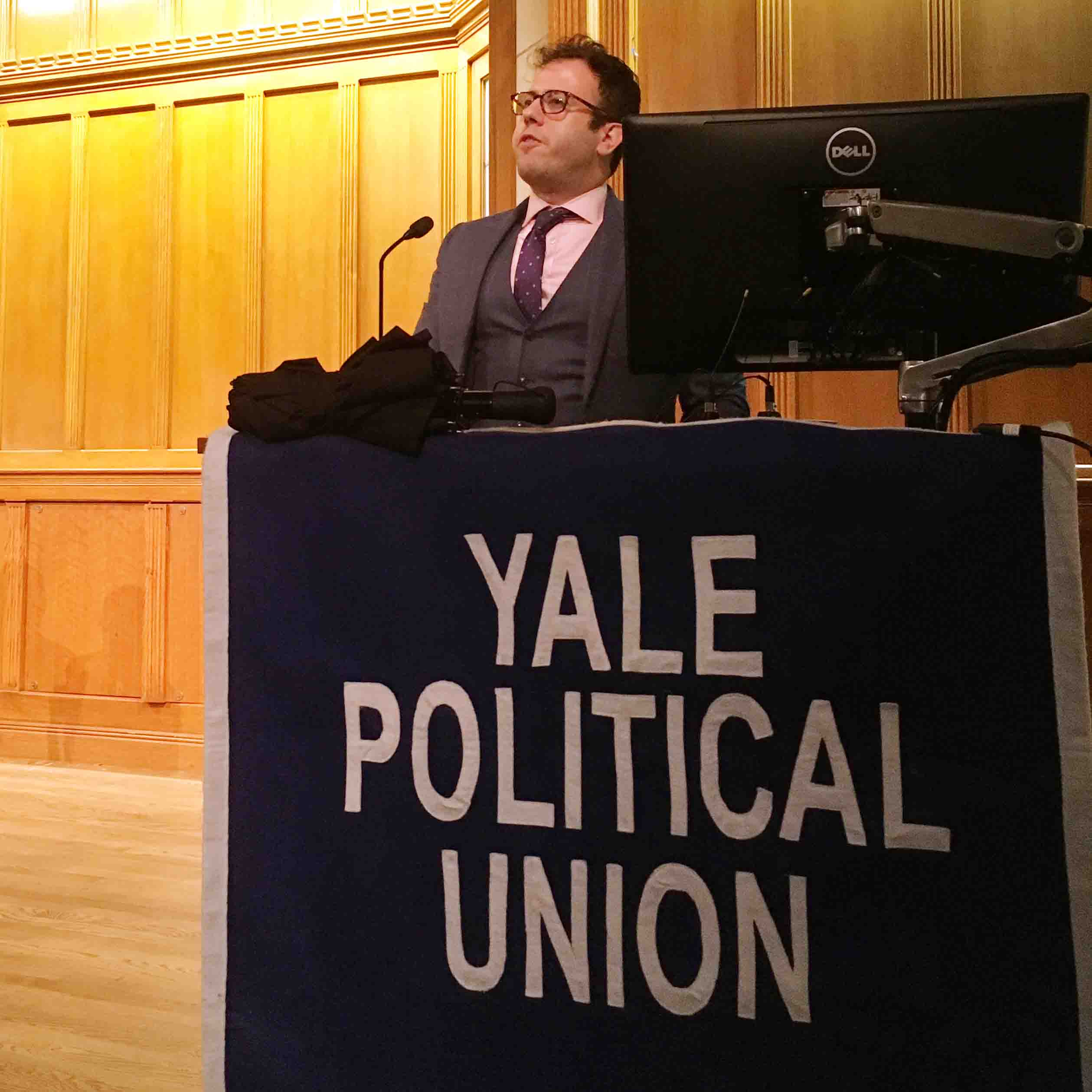
James Kirchick ’06, a former member of the Yale Independent Party and current candidate for the Yale Corporation, wasted no time before throwing a jab at the Party of the Right when he returned to the floor of Yale’s Political Union on Tuesday.
Later in the debate, while a member of the Yale Political Union was giving a speech, Kirchick motioned to a member of the Party of the Right, asking to borrow their Juul, a type of electronic cigarette. Despite his request, he did not use the Juul.
The Yale Political Union invited Kirchick to debate the topic “Resolved: Hate Speech is Free Speech.” In recent months, he has emerged as a divisive figure on campus and among alumni as he campaigns to garner the 4,266 signatures necessary to secure a spot on the ballot for the alumni fellow elections next year. Since he was not one of the two candidates nominated this year by the Alumni Nominating Committee — a body appointed by the Association of Yale Alumni — he must petition to make the ballot.
Kirchick, a journalist and foreign correspondent, has made headlines for his campaign, which advocates for the restoration of free speech and “basic liberal” values at Yale. He announced his campaign in late spring in an op-ed in The Wall Street Journal titled, “I’m Running to Restore Yale Values.”
During the debate on Tuesday, Kirchick argued that hate speech has not been well-defined and should not be regulated or censored.
“Attempts to define hate speech and limit it as many do is nothing more than an attack on First Amendment rights,” he said. “Freedom of expression and speech is the most fundamental right of a free society.”
Kirchick touched on a number of topics during his speech, which lasted for approximately 15 minutes. He argued that the absence of restrictions on speech has significantly benefited marginalized communities and that the media cannot move to censor hate speech while simultaneously fighting for a free press.
“Unfettered free speech, including so-called hate speech, helps marginalized communities,” Kirchick said. “The gay rights movement, like the movements for African American civil rights and women’s rights, would not be where they are today if it wasn’t for unfettered free speech.”
After concluding his speech, Kirchick fielded questions from YPU members, who gave speeches for the remainder of the two-hour event.
Some argued in favor of Kirchick’s position, while others pushed back, saying that hate speech psychologically harms members of marginalized communities.
Kirchick’s petition for the alumni fellow election has been fueled by a strong social media campaign and a series of speaking engagements in clubs — many of which are affiliated with Yale — across the nation. He has received endorsements from a variety of figures, including former Silliman Head of College Nicholas Christakis and former U.S. Sen. Joe Lieberman ’64 LAW ’67.
The William F. Buckley Program at Yale, which was founded in 2011, has also expressed support for Kirchick, advertising his campaign events on social media and actively endorsing his candidacy. Buckley Program President Cameron Koffman ’19 said the program is sympathetic to Kirchick’s attempts to promote free speech at Yale.
“The Buckley Program endorsed Jamie Kirchick because of his strong commitment to free speech and the free exchange of ideas on campus,” Koffman said. “The centrality of supporting free speech in Jamie’s campaign is compatible with the Buckley Program’s core values.”
Even before he launched his campaign, though, Kirchick had faced criticism for his arguments about free speech. In 2014, New York Times columnist Nesrine Malik said Kirchick’s broad generalizations suggest that there are no circumstances in which marginalized people have the right to complain about language that stigmatizes them.
“In Mr. Kirchick’s world, petitions are fatwas, and it’s only a matter of time before leafy university campuses are littered with the corpses of academic jihad’s victims,” Malik wrote.
A number of Kirchick’s other stances have also concerned some alumni. Kirchick opposed graduate student unionization and the University’s decision to change the title “master” to “head of college,” as well as the decision to award the 2017 Nakanishi Prize for leadership “in enhancing race and/or ethnic relations at Yale College” to one of the student leaders of the campus protests in the fall of 2015. He has also said that the high numbers cited for campus sexual assault rates are often inaccurate. In his platform, Kirchick proposes cutting administrative positions in the Title IX office and Office of Equal Opportunity Programs, as well as other affiliated positions, and suggests the extra funds be used to lower tuition and expand financial aid.
In a recent interview with the News David McWhirter ’72, an English professor at Texas A&M University, said that although Kirchick likes to “pose as a reasonable conservative,” he is “just another whining right-winger” who believes that student protesters are “mobs” and that conservatives are not welcome at Yale.
In addition to the state of free speech on campus, the University administration has come under fire from Kirchick and his supporters, who believe that the Yale Board of Trustee’s process of nominating its own candidates is neither transparent nor democratic.
“Aside from biographical statements, alumni receive no information about the values and priorities of the candidates,” according to Kirchick’s campaign website. “Instead, university administrators muzzle their hand-picked candidates chosen in an opaque process.”
Candidates can petition to be placed on the voting ballot, but they must receive a number of signatures equal to 3 percent of the total number of ballots distributed the previous year. This year, Kirchick must receive 4,266 alumni signatures by 11:59 p.m. on Oct. 1. In an interview with the News last week, Kirchick said he had received nearly 2,000 signatures.
A petition nominee has not secured a spot on the ballot for Yale Board of Trustees since local pastor Rev. W. David Lee DIV ’93 did in 2002. Lee lost the election to architect Maya Lin ’81 ARC ’86.
Nick Tabio | nick.tabio@yale.edu







